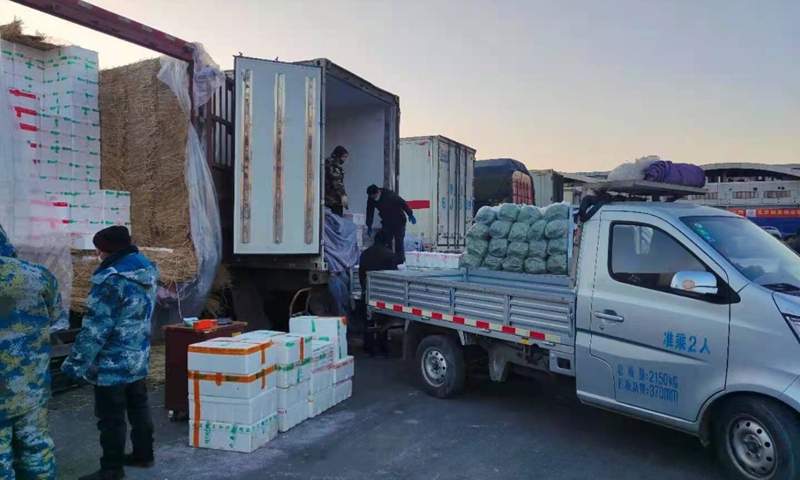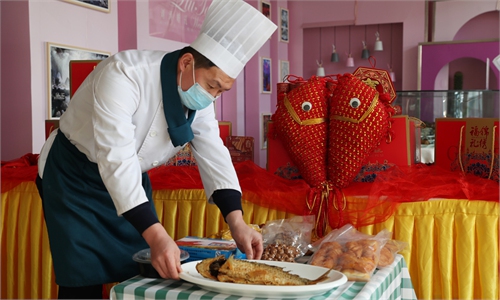IN-DEPTH / IN-DEPTH
Over 5,000 merchants at the Beijing Xinfadi wholesale market will stay in place to ensure market supply during Lunar New Year

Photo: Beijing Daily
The Xinfadi wholesale market, the epicenter of the COVID-19 outbreak in Beijing six months ago, has now entered "Spring Festival time," with more than 5,000 merchants choosing to remain open during Lunar New Year to ensure the city's supplies of agricultural and sideline products during the holidays.Beijing used to be an "empty city" at Chinese New Year because of the large number of migrant workers returning to their hometowns.
But this year, as local authorities encourage residents to celebrate the country's most important traditional holiday in cities where they work or live to support COVID-19 control work amid sporadic cluster infections having broken out in several places, large number of people will spend their Spring Festival in Beijing. The demand for various kinds of food in Beijing is also expected to increase compared to previous years.
As Xinfadi wholesale market is an important distribution center of Beijing's food supply, this year, more than 5,000 merchants in the market chose to stay in Beijing, compared to only about 2,000 merchants staying during normal years, to fully ensure supplies while doing their best to prevent and control the epidemic.
"On New Year's Eve, I plan to look after the shop, my son collects the money, and my husband is responsible for deliveries," Mao Yongxi, a scallion wholesaler whose hometown is North China's Henan Province, told the Global Times.
"I came to work at Xinfadi in 2001, the year of the SARS outbreak. At that time, I thought that I had not made any money and could never leave Beijing. But this year, I decided to stay here again not only to guarantee more Beijing citizens can have a good meal during the holiday, and for the vegetable farmers behind me to have more income in this difficult year," Mao said.
Xinfadi had been hit hardest by the COVID-19 epidemic in Beijing last year. On June 13th last year, Xinfadi was closed and Mao was put in quarantine for 33 days.
"At that time, I was overwhelmed with anxiety and sadness as I received countless calls from farmers and buyers every day. When the market reopened on August 15, I stood by the roadside and photographed the traffic in the market, unable to control my tears," Mao recalled.
The scallions in Mao's shop are mainly supplied to restaurants and supermarkets in the urban areas of Beijing. Despite the impact of the epidemic, recent sales before the festival have exceeded Mao's expectations. "Sometimes a truckload of scallions is sold out before dawn," Mao said.
"The daily supply during the Spring Festival in previous years was around 100 tons, but this year, considering the large number of people who are staying in Beijing, we may have 200 tons of vegetables in stock," Huang Shujin, a wholesaler who sells vegetables from the southern parts of China at Xinfadi told the Global Times.
Huang noted that in the winter, 40 percent of vegetables in the Beijing market come from southern China. Recently, the company he runs has six large trucks of vegetables entering Xinfadi for sale every day. The latest shipment is expected to arrive on Tuesday.
"My brother is at a farm in Guangdong Province, and I am 'guarding' Beijing, we are ready to transfer goods according to market demand." Huang said.
In order to make sure that the traders have a warm and meaningful Spring Festival in Beijing, the logistics department of Xinfadi has also prepared a series of activities during the vacation. For example, the market's New Year's Eve dumpling-boiling campaign, which has been going on for 30 years, will continue, and the amount of dumplings purchased has been increased from 4 tons in previous years to 10 tons, Beijing Daily reported.
Mao said most of the merchants are looking forward to the end of the epidemic. "When everyone can easily reunite with their families, it will be like New Year's day every day," she added.
According to local media, after the successful containment of the epidemic last year, the Xindadi market has been implementing strict prevention and control policies.
As of February 2, 8,378 merchants and staff were given COVID-19 vaccinations. The market has also conducted regular coronavirus testing of staff, traders and truck drivers, while carrying out regular disinfection of the environment and sampling of goods for testing.
Global Times



